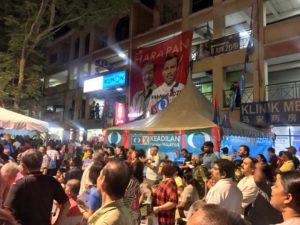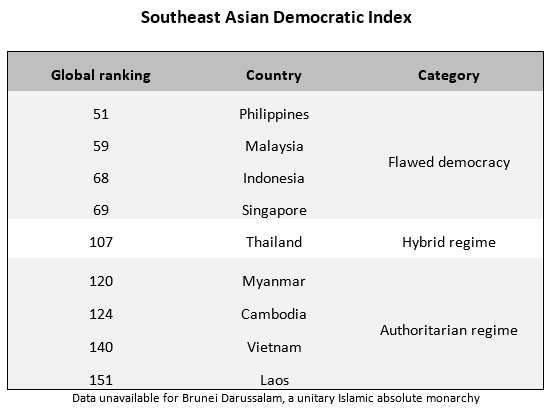 Breaking six decades of rule by the Barisan Nasional coalition, Malaysia’s opposition Pakatan Harapan coalition, headed by former Prime Minister Mahathir Mohamad, won 113 of 222 parliamentary seats in yesterday’s poll. Mohamad, 92, is expected to be sworn in today (HT: CFR).
Breaking six decades of rule by the Barisan Nasional coalition, Malaysia’s opposition Pakatan Harapan coalition, headed by former Prime Minister Mahathir Mohamad, won 113 of 222 parliamentary seats in yesterday’s poll. Mohamad, 92, is expected to be sworn in today (HT: CFR).
“We have freed ourselves from kleptocracy,” said one observer.
Mahathir was known for his autocratic tendencies, advocacy of Asian exceptionalism and occasional anti-Semitic jibes that prompted international condemnation. His electoral victory this week required that he work with some of the opposition figures who were his rivals in past decades, the Times reports.
Almost as extraordinary as the shock election result is the unlikely rapprochement between Mahathir and his former political nemesis, Anwar Ibrahim, ABC News adds.
The result was a political tsunami, said John Cabot University Professor Bridget Welsh. Many of the voters were simply unhappy with the high cost of living and unpopular tax hikes, and embarrassed by the 1MDB scandal [deemed “kleptocracy at its worst“], Welsh told NPR. She says Malaysia has moved in a very brave direction.

Credit: ASPI
“It’s repudiated the government that’s been in power for 61 years in a rout,” she says. “And it’s moving and I think it’s entering a new period of its political history with a lot of enthusiasm and a lot of hope.”
She told the Associated Press that Mahathir’s run was a game-changer for the opposition. “There is a massive swing across races. It’s a big shift. This is a repudiation of Najib’s government from all walks of life from the very rural northern states to the more industrial southern coast,” said Welsh, a contributor to the National Endowment for Democracy’s Journal of Democracy.
Malaysia’s 92-year old ex-leader, Mahathir met with the country’s king Thursday as he sought permission to swiftly form a government and quell concerns around the succession after a stunning opposition win over the coalition that has ruled Malaysia for six decades, Foreign Policy adds:
Mahathir abandoned his old party after the 1MDB corruption scandal in 2015 and began calling for then-Prime Minister Najib Razak’s resignation. He then joined the Pakatan Harapan opposition alliance, which scored a shock win in Wednesday’s election to break the Barisan Nasional (BN) coalition’s grip on power. BN and its predecessor had governed Malaysia uninterrupted since its birth as an independent country in 1957.

The result represents the end of kleptocracy and a victory for Anwarnomics – an alternative vision of a free and competitive economy and a harmonious, multiracial society personified by Anwar (left), writes Bloomberg analyst Andy Mukherjee:
As a deputy prime minister under Mahathir during the Asian crisis, Anwar came very close to dismantling the Malaysian version of crony capitalism when he decided to implement an austerity program, suspend big-bulge infrastructure investment and force big businessmen to take care of their own debt. But Mahathir, having seen long-time Indonesian strongman Suharto swept aside by the popular “reformasi” movement, fired Anwar and imposed capital controls. Anwar has since talked a pro-Western game, though his legal troubles and Barisan’s ability to somehow cling to federal power meant he never had a chance to do a big reset.
Above all, congratulations to the millions of ordinary Malaysians of all races, ages and religions who came together to forcefully eject a world-class kleptocrat leader that had brought disgrace to the nation while pretending nothing was amiss, said the online Malaysiakini.
The 1MDB affair has also revealed the continued complicity of global financial institutions, including major international banks, in kleptocratic money laundering, campaigner Cynthia Gabriel wrote for the National Endowment for Democracy’s Journal of Democracy.
The veteran ‘Dr M’—who once gained international prominence for his anti‑Western views and his popularisation of the ‘Asian values’ debate in the 1990s—warned that the elections would be ‘the dirtiest vote in history’. He’s unlikely to be right—not because the Malaysian election will be a model of transparency, but unfortunately because political transparency is increasingly rare in Southeast Asia, analyst Huong Le Thu wrote for Australia’s Strategic Policy Institute:
The Economist Intelligence Unit’s 2017 Democracy Index rates countries in five categories: ‘electoral process and pluralism; civil liberties; the functioning of government; political participation; and political culture’. It then classifies countries as ‘full democracies’, ‘flawed democracies’, ‘hybrid regimes’ or ‘authoritarian regimes’. Not a single country in Southeast Asia was rated a full democracy.








